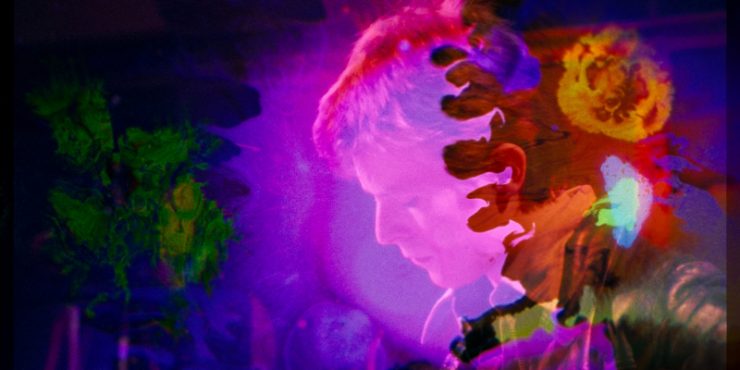The David Bowie estate has always been careful about any cinematic interpretations of his life and career. This was true even before Bowie’s death in 2016. Todd Haynes made one of the seminal films about the glam rock era with 1998’s Velvet Goldmine, but he had to do so without any of Bowie’s songs when the singer refused permission. Bowie spent five decades defining and redefining himself so much that the concept of encapsulating him in a single film must have seemed insulting. Brett Morgan’s Moonage Daydream gets to use Bowie’s songs, and with the assistance of frequent Bowie collaborator Tony Visconti, he rearranges and remixes a lot of the classic tunes to contextualize his bevy of concert films, television interviews, and other never-seen-before footage.
Those familiar with Morgan will know that he does not employ traditional documentary techniques. His other biographical films (including The Kid Stays in the Picture and Cobain: Montage of Heck) are expanded montages, utilizing arresting imagery and immersive mood more so than talking head interviews or straightforward biographical information. In its refusal to contain itself within the limits of more conservative nonfiction, I could see how Moonage Daydream would be more alluring to Bowie’s estate than, say, Stardust, the unauthorized biopic in 2020 that came and went quickly when word got out that none of Bowie’s actual music would be included. Getting the songs – those brilliant, phenomenal songs – is most, if not all, of the battle. Past that, Moonage Daydream is a spacey dreamscape molded completely in Morgan’s unrestrained image.
There are Brett Morgan movies that I like. His addition to ESPN’s “30 for 30” series, June 17th, 1994, is perhaps the best of the entire series, and The Kid Stays in the Picture is one of the most entertaining film history documents that you can see. But that film’s star is producing legend Robert Evans. Daydream‘s star is, of course, David Bowie, but too often his shine is interrupted by Morgan’s high-handed style, which overwhelms and adds a layer of pretension on the story of an artist who was anything but. Morgan’s love of cross-cutting, contextualizing Bowie against clips from an array of cinematic eras (the silent masters, B movie sci-fi, Italian neorealism) becomes more about the director’s own encyclopedic cultural knowledge than his subject’s chameleonic persona.
When you’re given access to all these amazing clips of David Bowie and his entire musical library, there is a very high floor for any movie that will be made from it. The large bank of interviews showcases his lifelong talent for eloquence as well as his steadied combativeness, and the candid, backstage clips come the closest to showing what Bowie was like when he wasn’t performing. I don’t think there is a film that could find the human behind Bowie’s perpetual personas, and I think that’s by design. But Morgan’s attempt here – and most aggravatingly, his deconstruction of a lot of the songs – feels to miss the mark. The film is at its best when Bowie is shown without the director’s interference. Moonage Daydream certainly has an authorial voice, but it should be Bowie’s, not Morgan’s.
Written, Produced and Directed by Brett Morgan










